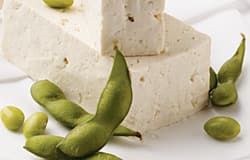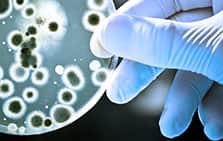Soy compound helps prevent prostate cancer metastasis
Tuesday, June 10, 2014. In an article published ahead of print on May 28, 2014 in the American Journal of Clinical Nutrition, researchers at Northwestern University report the outcome of experiments conducted by their group and others which show a protective effect for the soy isoflavone genistein against prostate cancer cell detachment, invasion and metastasis.
"The earliest steps of the metastatic cascade involve changes in cellular adhesion and migration and then localized invasion into the surrounding tissue," R. C. Bergan and colleagues explain. "This is followed by extravasation into the bloodstream, invasion into and implantation at distant site, and finally growth at that secondary site."
Research conducted by the team, described in 1996 in Clinical & Experimental Metastasis and in Molecular Pharmacology in 1997, demonstrated that genistein dose-dependently inhibited human prostate cancer cell detachment, which is due to the isoflavone's ability to increase cell adhesion. In further research, the group implanted human prostate cancer cells in mice and observed that cellular adhesion increased with the administration of genistein. This was accomplished at plasma genistein levels similar to those measured in men given 150 milligrams genistein per day, indicating that the compound inhibits cell detachment at concentrations attainable by humans.
In addition to detaching from the extracellular matrix, invasion is facilitated by the production of matrix metalloproteinases (MMPs) that degrade surrounding tissue. A relatively low concentration of genistein, corresponding to concentrations of free genistein attained in the blood after dietary consumption, was found by Dr Bergan's team to reduce the expression and activity of MMP-2 in cultured human prostate cancer cells. Genistein was also shown to directly inhibit prostate cancer cell invasion at this concentration in other research conducted by the team.
In a study reported in Cancer Research, mice implanted with prostate cancer that received an amount of genistein approximating that of Japanese men who consume a high soy diet or American men who consumed 150 mg genistein per day, lung metastasis was dose-dependently reduced—a finding which was corroborated in rodent models of spontaneous prostate cancer. And in a clinical trial conducted by the Northwestern University group, genistein at a dose of 2, 4 or 8 mg genistein per kilogram body weight, which corresponds with concentrations attained in previous in vitro and animal studies, was found to be well tolerated. A phase II randomized, controlled trial of genistein administered for a four week average period prior to prostate cancer surgery resulted in a reduction of MMP-2 by 76%.
"At concentrations of genistein similar to those consumed in a soy-based diet, this small molecule can decrease prometastatic phenotypes in vitro, including those related to cellular adhesion, production of MMP-2, and cellular invasion," the authors write. "These results highlight the potential of genistein as an antimetastatic agent for patients with prostate cancer, and thereby its potential to decrease prostate cancer mortality."
|
 |
What's Hot
The January 2014 issue of the journal Military Medicine published the finding of researchers at East Tennessee State University of a positive association between higher vitamin D levels and prostate cancer survival.
The participants included veterans diagnosed with prostate cancer prior to May 2007. A percentage of the group had been tested for vitamin D levels, among whom more than half had at least one follow-up test result.
At the end of five years, 27.9% of the men had died. Initial blood test results indicated vitamin D deficiency in over a third of those tested, and follow-up tests revealed improvements resulting in deficiency among less than 20%. Those who were initially revealed to be deficient in vitamin D had a 6% lower risk of surviving prostate cancer in comparison with nondeficient men. For those whose deficiency was detected at follow-up, the risk was 9% lower.
"To the best of our knowledge, this is the first published report indicating that vitamin D status and monitoring are associated with significantly better outcomes in veteran prostate cancer patients," authors Tatyana Der, MD, and colleagues announce. As possible mechanisms, they cite vitamin D's influence on cellular invasion, angiogenesis and metastasis, as well as its ability to inhibit growth in prostate cancer cells.
"There are several compelling reasons for testing and treating prostate cancer patients with vitamin D, pending large-scale prospective studies." they remark. "Indeed, another study found that treating patients with both metastatic prostate cancer and vitamin D deficiency with 2,000 IU/day of vitamin D improved bone pain and muscle strength."
"We recommend that all prostate cancer patients be prescribed 2,000 IU vitamin D3 daily, with this dose appropriately adjusted based on sequential monitoring," they conclude. |
 |
Highlight
Check out Life Extension's blog

Keep abreast of what's happening in the fields of nutrition, longevity and disease prevention with Life Extension's blog. New articles by Life Extension's own Michael A Smith, MD, Maylin Rodriguez-Paez, RN, and others are regularly posted to keep you current with insider information. Recent posts include:
- 6 Surprising Health Benefits of Garlic
- All About Biotin
- Eat Nuts, Live Longer?
- Asthma Relief 101
- Don't Stop Taking Calcium Supplements
- Can Young Blood Treat Alzheimer's?
. . . and many more!
|

|
Latest Products |
 |
|
Emerging research suggests that different sources of omega-3 fatty acids, such as fish oil and krill oil, provide complementary effects upon cellular targets throughout the body.
Scientists suggest that combining fish oil and krill oil may provide enhanced support for cardiovascular health and the brain due to the different ways that fish oil and krill oil are taken up by our cells. Fish oil and krill oil share many important similarities, such as reducing levels of omega-6 relative to beneficial omega-3 fatty acids. Most Americans consume too many omega-6 polyunsaturated fatty acids and not enough omega-3s.
Evidence suggests that by combining both fish and krill oil, you can maximize uptake and the protective benefits of a wide spectrum of omega-3 fatty acids. To provide enhanced coverage, a new Super Omega contains a potent concentration of fish oil, olive fruit, and sesame lignans, plus krill and astaxanthin. |
| |
 |
|
The new Rejuvenating Scalp Serum contains argan oil, which is unlike any other oil. It is a "dry" oil, easily absorbed by the skin so it leaves no residue or build-up on the hair or scalp. Argan oil has been shown to be exceptionally effective at targeting scalp skin cells to prevent dry scalp conditions, nourish hair follicles, and revive dull, tired, brittle hair.
The effectiveness of the argan oil in Rejuvenating Scalp Serum is enhanced by four compounds:
- Procyanidin B-2 to support hair growth.
- Biotin to help support hair growth.
- Copper to support hair follicles.
- Tea extracts to inhibit free radicals that cause dryness, itchiness, and dullness of the scalp.
|
|
 |
Related Articles
|
|












